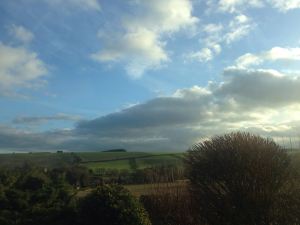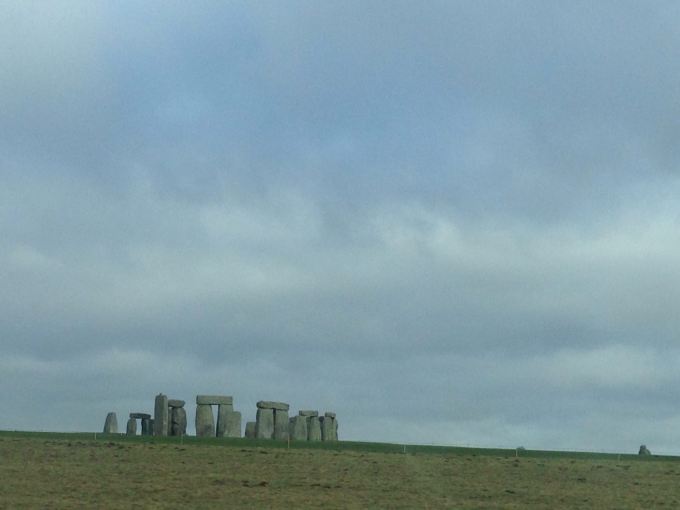Recently we started work on researching our last county for The Lost Tales tour- land of standing stones, mist and rainbows, white horses and chalk downs, Wiltshire.
Something we've found on our little forays about the country, both for this project and our walkabout act, is that landscapes really do change as you cross this small island of ours. And Wiltshire was no exception. In fact, it felt that as we passed the 'Welcome to Wiltshire sign', someone pressed a big button and turned the dial to 'classic Wiltshire landscape'. Almost immediately we were chasing cloud shadows across huge, undulating chalk downlands under a sprawling winter sky. It looked REALLY Wiltshire-y. Which probably sounds like a stupidly obvious statement, but hey, I'm really very pregnant right now and that's probably the best you can hope for in this particular post.
we've found on our little forays about the country, both for this project and our walkabout act, is that landscapes really do change as you cross this small island of ours. And Wiltshire was no exception. In fact, it felt that as we passed the 'Welcome to Wiltshire sign', someone pressed a big button and turned the dial to 'classic Wiltshire landscape'. Almost immediately we were chasing cloud shadows across huge, undulating chalk downlands under a sprawling winter sky. It looked REALLY Wiltshire-y. Which probably sounds like a stupidly obvious statement, but hey, I'm really very pregnant right now and that's probably the best you can hope for in this particular post.
 we've found on our little forays about the country, both for this project and our walkabout act, is that landscapes really do change as you cross this small island of ours. And Wiltshire was no exception. In fact, it felt that as we passed the 'Welcome to Wiltshire sign', someone pressed a big button and turned the dial to 'classic Wiltshire landscape'. Almost immediately we were chasing cloud shadows across huge, undulating chalk downlands under a sprawling winter sky. It looked REALLY Wiltshire-y. Which probably sounds like a stupidly obvious statement, but hey, I'm really very pregnant right now and that's probably the best you can hope for in this particular post.
we've found on our little forays about the country, both for this project and our walkabout act, is that landscapes really do change as you cross this small island of ours. And Wiltshire was no exception. In fact, it felt that as we passed the 'Welcome to Wiltshire sign', someone pressed a big button and turned the dial to 'classic Wiltshire landscape'. Almost immediately we were chasing cloud shadows across huge, undulating chalk downlands under a sprawling winter sky. It looked REALLY Wiltshire-y. Which probably sounds like a stupidly obvious statement, but hey, I'm really very pregnant right now and that's probably the best you can hope for in this particular post.
First stop was the charming village of Colleton Kingston, where we were welcomed into a well established coffee morning that was well supplied with cake (so well supplied, in fact, that our lemon drizzle returned home intact, much to my daughter's delight). Now here come a few more over generalised statements- you have been warned. Wiltshire is an interesting place, in that it is so very different from the other counties we have visited. Devon seems defined by sea and moor, Gloucestershire by the forest and the rivers that carve up the landscape and the people. In both counties, we were never short of opinions from locals on what defined them as a people, as a county. Geographically, there was a strong sense of otherness and uniqueness. In Wiltshire, though, this wasn't so apparent. Instead, it felt that this was a county with more blurred borders. Surrounded by other counties on all sides, there was less of that definitive character, and more of a sense of being part of the whole. A few stories we were told shamelessly crossed the borders into Somerset or Hampshire- that would NEVER have happened in Devon!
Even the tale that purports to define Wiltshire folk as a collective, The Moonraker's, holds no great importance in the culture of the people we spoke to. Unlike 'The Bears', which is still so potent and sensitive a story in Gloucestershire, the villagers that we met seemed ambivalent about this story which either casts them as wily smugglers or simpletons, depending on which version you encounter. So even their relationship to stories themselves felt different. Maybe the openness of the landscape and the proximity to other counties created an openness in the way that stories were shared, and passed on and mixed together.
As with all generalisations, however, there are exceptions to the rule. And here is a big one. Wiltshire IS divided. But not by anything cultural or geographical. No, Wiltshire is divided by... the A303. That great road of roads. Maybe it's naive to say that this isn't cultural or geographical, because the road holds such a powerful position in the county. It slices up Wiltshire into North and South, a boundary that reared it's head in a number of the stories that we were told during our time there. And it has almost mythical status. There's even a whole book written about it. It is similarly the bane of locals lives during Solstice and the lifeblood of the county, connecting village inhabitants to the big cities at it's either end. According to some residents, this is what allows the villages to stay alive, this access to work that allows them to remain in the villages that they call home.
And then there is the biggy. The place that jumps to mind first when considering the county, and certainly the first image that jumped out in our internet research. Stonehenge. We were expecting to be snowed under with stories from this iconic place. We felt certain that stories lurked amongst it's stones. But not, it seems, for the local people in Colleton Kingston and Kingston Deverill. In fact, despite us driving past it TWICE in our short trip (we were pretty excited about this), nobody even mentioned it and we had to crowbar the subject into conversation. The feeling amongst the folk that we talked to was pretty unanimous- it isn't really for them. One resident told us that she only ever goes there when she has friends or family staying from abroad. That, as a place, it holds no great significance in their lives. Mostly it means traffic. Traffic jams and tourists and new road plans and 'that place you drive past on the way to work'.

It may be a bit of a challenge piecing together this next iteration of the play. For one, I've got to go and have a baby, which by necessity is going to create a small hiatus in creativity. But also, the stories that we uncovered were less of your robust, told-and-told-again, beginning-middle-end type stories. They felt a little more ephemeral, a bit harder to pin down, much like our experience of Wiltshire itself. So the process of drawing out the main three tales feels a bit less straightforward than, say, Gloucestershire, where the three tales pretty much wrote themselves. But then, all the best things come out of a challenge I find. So, watch this space. And maybe take a little trip to Wiltshire while you're waiting? It's blooming beautiful.